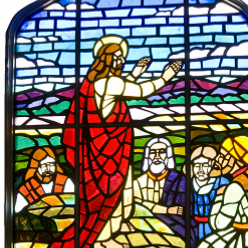What is Hell? It is a single word in Latin and English translations that in the popular imagination brings together the Hebrew idea of the place of the dead (Sheol), and Jesus’ reference to a place of destruction (Gehenna). Rugby Union management in Australia has said that Israel Folau can’t talk about it.
Sheol
Jesus only spoke a little about Sheol (Greek Hades) the place of the dead. This is found in Luke 16. For those who have lived a life of luxury while despising those who cared nothing for the poor who lived with them, it is a place of discomfort. For those who have lived in poverty and suffering, it is a place of comfort and security. It is a simple story, with a powerful message. It is a judgment of justice, matching the outcome with responsibility taken or neglected.
Gehenna – hell
Jesus talked a lot about Gehenna. It is place of the final judgment for the wicked, where the judgment is terminal. In no way can Jesus be considered to be describing the abode of the dead. Here is an example:
Matt 5:27 “You have heard that it was said, ‘Do not commit adultery.’ 28 But I say to you that everyone who looks at a woman lustfully has already committed adultery with her in his heart. 29 If your right eye causes you to offend, pluck it out and throw it away. It is better for you to lose one of the parts of your body than for your whole body to go into Gehenna – Hell. 30 And if your right hand causes you to offend, cut it off and throw it away. It is more profitable for you that you lose one of the parts of your body than for your whole body to go into Gehenna – Hell.
When Israel Folau quoted 1 Cor. 6:9, he was following Jesus’ teaching on the destruction that awaits the wicked. He was willing to lose his $4m contract in order to say something that he was forbidden to say by Rugby Union management.
1 Cor. 6:9 Do you not know that wrongdoers will not inherit the kingdom of God? Do not be deceived: neither the sexually immoral nor idolaters nor adulterers nor men who have sex with men will inherit this kingdom.
Eternal Life
The New Testament has a lot to say on eternal life. It is the reward for those who follow Jesus, being those who participate in his plan to continue to change human life on earth from one that started with the innate cruelty of natural selection to one in which we learn to take care of one another. A starting point, largely learnt in western (Christian) society, is the golden rule:
Matt. 7:12 “Whatever you wish for people to do to you, do to them.”
Something that has been forgotten, at least by those who already have everything their hearts could desire: it is that only a radical change can bring the kingdom of heaven to earth.
Matt. 7:24 “Everyone who hears these words of mine and puts them into practice is like a wise man who built his house on the rock. 25 The rain came down, the rivers rose, and the winds blew and beat against that house; yet it did not fall, because it had been founded on the rock. 26 But everyone who hears these words of mine and does not put them into practice is like a foolish man who built his house on the sand. 27 The rain came down, the rivers rose, and the winds blew and beat against that house, and it fell, and its fall was great.”
Perhaps on the subject of how to order our society, we think we know better than Jesus. Yet for those who reject Jesus’ teachings there is unlikely to be the future reward of shared life with Jesus in heaven. For example, in this age sexual immorality seems to be outside of any sense of wrong-doing, despite it being destructive of relationships. Isn’t it worth considering Paul’s comments on this matter, directed at Christians?
1 Cor. 6:18 Flee from sexual immorality. All other sins a person commits are outside the body, but whoever sins sexually, sins against their own body. 19 Do you not know that your bodies are temples of the Holy Spirit, who is in you, whom you have received from God? You are not your own, 20 you were bought at a price. Therefore honour God with your bodies.
Conclusion
Scott Morrison was right when he said that God is a god of love. Yet Christians know that it is not unconditional love in the sense that what we do doesn’t count. For God has a purpose and plan for this world and Jesus is the key to that plan. For those who want to be part of that plan there is a clear path, as Israel Folau said, “Repent and turn to Jesus.”
